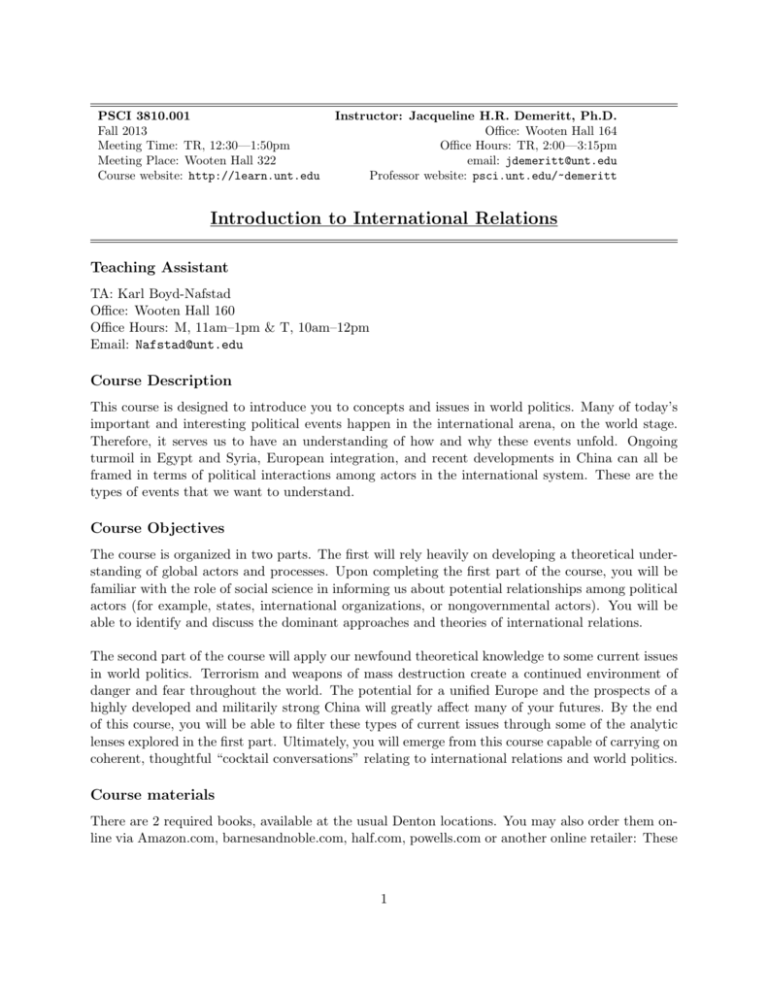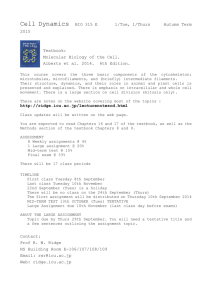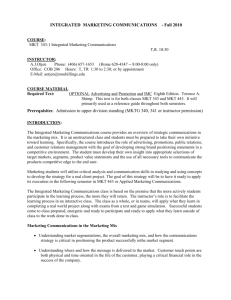
PSCI 3810.001
Fall 2013
Meeting Time: TR, 12:30—1:50pm
Meeting Place: Wooten Hall 322
Course website: http://learn.unt.edu
Instructor: Jacqueline H.R. Demeritt, Ph.D.
Office: Wooten Hall 164
Office Hours: TR, 2:00—3:15pm
email: jdemeritt@unt.edu
Professor website: psci.unt.edu/~demeritt
Introduction to International Relations
Teaching Assistant
TA: Karl Boyd-Nafstad
Office: Wooten Hall 160
Office Hours: M, 11am–1pm & T, 10am–12pm
Email: Nafstad@unt.edu
Course Description
This course is designed to introduce you to concepts and issues in world politics. Many of today’s
important and interesting political events happen in the international arena, on the world stage.
Therefore, it serves us to have an understanding of how and why these events unfold. Ongoing
turmoil in Egypt and Syria, European integration, and recent developments in China can all be
framed in terms of political interactions among actors in the international system. These are the
types of events that we want to understand.
Course Objectives
The course is organized in two parts. The first will rely heavily on developing a theoretical understanding of global actors and processes. Upon completing the first part of the course, you will be
familiar with the role of social science in informing us about potential relationships among political
actors (for example, states, international organizations, or nongovernmental actors). You will be
able to identify and discuss the dominant approaches and theories of international relations.
The second part of the course will apply our newfound theoretical knowledge to some current issues
in world politics. Terrorism and weapons of mass destruction create a continued environment of
danger and fear throughout the world. The potential for a unified Europe and the prospects of a
highly developed and militarily strong China will greatly affect many of your futures. By the end
of this course, you will be able to filter these types of current issues through some of the analytic
lenses explored in the first part. Ultimately, you will emerge from this course capable of carrying on
coherent, thoughtful “cocktail conversations” relating to international relations and world politics.
Course materials
There are 2 required books, available at the usual Denton locations. You may also order them online via Amazon.com, barnesandnoble.com, half.com, powells.com or another online retailer: These
1
online bookstores often offer textbook at substantial discounts over the traditional university bookstores. If ordering textbooks online, please make sure you get the correct edition:
1. Stiles, Kendall W (2012). Case Histories in International Politics, 7th edition. New York,
NY: Pearson/Longman.
2. Goldstein, Joshua S. and Jon C. Pevehouse (2012). International Relations, 10th edition
(2012–2013 update). New York, NY: Pearson/Longman.
In addition, the course is supported by a website: Go to http://learn.unt.edu to login. I will post
this syllabus online, and you can also check your grades there. From time to time, I may also post
additional readings or references of relevance for our subject matter.
Student assignments & responsibilities
Exams: Seventy-five percent of your grade will be determined by three (non-cumulative) exams.
The first will be administered in-class on Thursday, 19 September; the second will be administered in-class on Tuesday, 22 October; the third will be given as scheduled during final exam
week (Thursday, 12 December; 10:30am–12:30pm). Exams may be a mix of multiple choice,
matching, fill-in-the-blank, and short essay questions. Each exam is worth 25% of your final grade.
Make-up Exams: If you cannot attend one of the tests, you need to notify me by email as soon
as possible. Make-up exams will only be given to students who have been unable to sit for the
examination as a consequence of illness requiring medical care, required university activities, or a
personal emergency of a serious nature. To be excused without penalty, documentation or prior
permission is required. Make-up exams will be scheduled as soon as possible, at a time to be
mutually agreed upon by the student(s) and myself.
Quizzes: There will be a total of five map quizzes administered throughout the class. Each quiz
will focus on a different region of the world. The map quizzes will be announced and are also listed
in the table and on the course outline below. I will not give any make-up quizzes, except under the
most unusual circumstances. Failing to attend class on the day a quiz is given will result in a grade
of zero unless there is a documented medical reason for your absence. If you miss a day that a
quiz was given for a documented medical reason, a make-up quiz can be taken with the instructor’s
approval. Combined, these quizzes will be worth 15% of your final grade.
region
Latin America
Africa
Middle East
Europe
Asia
day, date
Thursday, 12 September
Tuesday, 1 October
Tuesday, 15 October
Thursday, 31 October
Tuesday, 19 November
2
Attendance and Participation: International relations are more than just historical facts and concepts to be memorized; they encompass the study of human interactions, behaviors of nation-states,
and broad social phenomena. These can be most clearly understood through discussion and the
evaluation of alternative perspectives. In other words, participation increases active learning. While
this course will have a large lecture component, there will also be opportunities for participation
in classroom exercises and discussions. Participation will be worth 10% of your final grade and is
based on a combination of attendance, answering and asking questions, and participating in classroom discussion and exercises.
Grading/Evaluation
Grades are assigned in accordance with the following scale:
90 - 100% = A
80 - 89% = B
70 - 79% = C
60 - 69% = D
below 60% = F
Academic Honor Code
Academic dishonesty will not be tolerated in this class. Incidents of plagiarism and/or cheating
will result in a failing grade for the class and further penalties per the University’s judicial process.
Students are advised to review the policies established in the UNT Policy on Academic Integrity
regarding academic honesty (http://www.unt.edu/policy/UNT_Policy/volume3/18_1_16.pdf).
If you have any questions about what constitutes plagiarism or cheating, see the professor. Finally,
students agree that, by taking this course, all required assignments may be subject to submission
for textual similarity review to www.turnitin.com or a similar plagiarism prevention system.
The UNT Department of Political Science Policy on Cheating and Plagiarism: The UNT Policy on
Academic Integrity defines cheating as the use of unauthorized assistance in an academic exercise,
including but not limited to: use of any unauthorized assistance to take exams, tests, quizzes, or
other assessments; dependence upon the aid of sources beyond those authorized by the instructor in
writing papers, preparing reports, solving problems or carrying out other assignments; acquisition,
without permission, of tests, notes or other academic materials belong to a faculty or staff member
of the University; dual submission of a paper or project, or re-submission of a paper or project to
a different class without express permission from the instructor; any other act designed to give a
student an unfair advantage on an academic assignment. Plagiarism is defined as use of another’s
thoughts or words without proper attribution in any academic exercise, regardless of the student’s
intent, including but not limited to: the knowing or negligent use by paraphrase or direct quotation
of the published or unpublished work of another person without full and clear acknowledgement
or citation; the knowing or negligent unacknowledged use of materials prepared by another person
or by an agency engaged in selling term papers or other academic materials. Forgery is defined
as altering a score, grade or official academic University record or forging the signature of an instructor or other student. Fabrication is defined as falsifying or inventing any information, data
or research as part of an academic exercise. Facilitating academic dishonesty is defined as helping
or assisting another in the commission of academic dishonesty. Finally, sabotage is defined as acting to prevent others from completing their work or willfully disrupting the academic work of others.
3
The following academic penalties may be assessed at the instructors discretion upon determination
that academic dishonesty has occurred. Admonitions and educational assignments are not appealable:
A. Admonition. The student may be issued a verbal or written warning.
B. Assignment of Educational Coursework. The student may be required to perform additional
coursework not required of other students in the specific course.
C. Partial or no credit for an assignment or assessment. The instructor may award partial or no
credit for the assignment or assessment on which the student engaged in academic dishonesty,
to be calculated into the final course grade.
D. Course Failure. The instructor may assign a failing grade for the course.
Should the procedure for appeal of a case of academic dishonesty extend beyond the date when
the instructor submits course grades for the semester, the student will be assigned a grade that
reflects the penalty, which shall be adjusted, as appropriate, at the conclusion of any appeal process.
Students may appeal any decision under this policy by following the procedures laid down in the
UNT Policy on Academic Integrity.
Accommodations (ODA / ADA)
The University of North Texas is on record as being committed to both the spirit and letter of
federal equal opportunity legislation; reference Public Law 92-112 - The Rehabilitation Act of 1973
as amended. With the passage of new federal legislation entitled Americans with Disabilities Act
(ADA), pursuant to section 504 of the Rehabilitation Act, there is renewed focus on providing this
population with the same opportunities enjoyed by all citizens.
If you are a student with a disability and wish to request accommodations, please notify me by the
second week of class. You are also encouraged to contact the Office of Disability Accommodation
at (940) 565-4323. The ODA makes formal recommendations regarding necessary and appropriate
accommodations based on specifically diagnosed disabilities. The Political Science Department
cooperates with the Office of Disability Accommodation to make reasonable accommodations for
qualified students with disabilities. Please present your written accommodation request on or before
the add/drop deadline.
Classroom conduct
Classroom courtesy is an essential component of creating an effective learning environment. All
students have the right to learn without unnecessary distractions. These distractions include: laptops or tablets used for purposes other than note-taking, smartphones, cellphones and the like,
talking during lectures (unless recognized by the instructor), reading newspapers, falling asleep,
etc. If you need a cell phone for emergency purposes, leave it on vibrate. Entering and leaving
are also significant sources of distraction. It is your responsibility to be on time and to stay for
the entire class. In circumstances where you need to leave early, tell the instructor beforehand.
4
Repeated disruptions of class will lead to a reduction in your final grade.
Class discussions of political issues can often stimulate strong feelings and heated debate. I ask
all of you to respect the opinions of your fellow students, even if you do not agree with them. In
simple terms, that means not interrupting other students while they are speaking and not verbally
attacking them for their beliefs. While I believe that it is essential to connect theory to current
events, I will cut short debates of current events that do not enhance the understanding of course
concepts. I expect you to offer substantive comments and questions when appropriate in class. I
also expect you not to dominate a discussion, but to allow free discussion and exchange of ideas.
Course content & Outline
Theories & Approaches to World Politics
Thurs, 29 Aug: Course Overview
Tues, 3 Sept: Understanding International Relations
• Goldstein – Chapter 1 (The Globalization of International Relations)
Thurs, 5 Sept: Realism
• Goldstein – Chapter 2 (Realist Theories)
Tues, 10 Sept: Liberalism
• Goldstein – Chapter 3 (Liberal and Social Theories)
Thurs, 12 Sept: Alternatives to Realism/Liberalism
• Map quiz: Latin America
• Stiles – Chapter 1 (Rationality: The Cuban Missile Crisis) and Chapter 9 (Feminist International Relations Theory: Women and Security)
Tues, 17 Sept: Catch-up and Review
Thurs, 19 Sept: EXAM I
Tues, 24 Sept & Thurs, 26 Sept: Film (TBA)
Issues in World Politics: Conflict & War
Tues, 1 Oct: Intro to Conflict & War
• Map quiz: Africa
• Goldstein – Chapter 5 (International Conflict)
5
Thurs, 3 Oct: Why States Fight
• Stiles – Chapter 3 (The Balance of Power: China-India-Pakistan)
Tues, 8 Oct: Outcomes & Consequences of War
• Review Goldstein’s Chapter 5
Thurs, 10 Oct & Tues, 15 Oct: Preventing & Limiting War
• Map quiz (Tues, 15 Oct): Middle East
• Review Goldstein’s Chapter 5
Thurs, 17 Oct: Catch-up and Review
Tues, 22 Oct: EXAM II
Thurs, 24 Oct: No Class (PSSi)
Issues in World Politics: International Organizations & Law
Tues, 29 Oct: Intro to IOs; the United Nations
• Goldstein – Chapter 7 (International Organization, Law, and Human Rights)
Thurs, 31 Oct: International Law
• Map quiz: Europe
• Review Goldstein’s Chapter 7
Tues, 5 Nov & Thurs, 7 Nov: Film (TBA)
Issues in World Politics: International Political Economy
Tues, 12 Nov: Trade & Finance
• Stiles – Chapter 14 (Globalization: Sweatshops and Outsourcing)
Thurs, 14 Nov: Interdependence; Regionalism; Globalization
• Stiles – Chapter 15 (Economic Regionalism: The European Union) and Chapter 17 (Global
Governance: The Great Recession)
6
Issues in World Politics: Terrorism; Human Rights
Tues, 19 Nov: Terrorism
• Map quiz: Asia
• Stiles – Chapter 7 (Terrorism: Al Qaeda)
Thurs, 21 Nov: Intro to Human Rights
• Reading assignment TBA
Tues, 26 Nov: Why Repression?
• Reading assignment TBA
Thurs, 28 Nov: No Class (Thanksgiving)
Tues, 3 Dec: Preventing & Limiting Repression
• Stiles – Chapter 6 (Intervention: Bosnia) and Chapter 19 (International Law: The International Criminal Court)
Thurs, 5 Dec: Catch-up and Review
Thursday, 12 Dec; 10:30am–12:30pm: Exam III
This syllabus is a guideline and is subject to change at any time.
7






